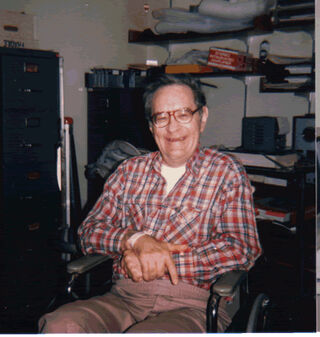Memory
HM, the Man with No Memory
Henry Molaison (HM) taught us about memory by losing his.
Posted January 16, 2012 Reviewed by Jessica Schrader

Henry Molaison, known by thousands of psychology students as "HM," lost his memory on an operating table in a hospital in Hartford in August 1953. He was 27 years old and had suffered from epileptic seizures for many years.
William Beecher Scoville, a Hartford neurosurgeon, stood above an awake Henry and skilfully suctioned out the seahorse-shaped brain structure called the hippocampus that lay within each temporal lobe. Henry would have been drowsy and probably didn't notice his memory vanishing as the operation proceeded.
The operation was successful in that it significantly reduced Henry's seizures, but it left him with a dense memory loss. When Scoville realized his patient had become amnesic, he referred him to the eminent neurosurgeon Dr. Wilder Penfield and neuropsychologist Dr. Brenda Milner of Montreal Neurological Institute (MNI), who assessed him in detail. Up until then, it had not been known that the hippocampus was essential for making memories, and that if we lose both of them we will suffer a global amnesia. Once this was realized, the findings were widely publicized so that this operation to remove both hippocampi would never be done again.
Penfield and Milner had already been conducting memory experiments on other patients and they quickly realized that Henry's dense amnesia, his intact intelligence, and the precise neurosurgical lesions made him the perfect experimental subject. For 55 years, Henry participated in numerous experiments, primarily at Massachusetts Institute of Technology (MIT), where Professor Suzanne Corkin and her team of neuropsychologists assessed him.
Access to Henry was carefully restricted to less than 100 researchers (I was honored to be one of them), but the MNI and MIT studies on HM taught us much of what we know about memory. Of course, many other patients with memory impairments have since been studied, including a small number with amnesias almost as dense as Henry's, but it is to him we owe the greatest debt. His name (or initials!) has been mentioned in almost 12,000 journal articles, making him the most studied case in medical or psychological history. Henry died on December 2, 2008, at the age of 82. Until then, he was known to the world only as "HM," but on his death his name was revealed. A man with no memory is vulnerable, and his initials had been used while he lived in order to protect his identity.
Henry's memory loss was far from simple. Not only could he make no new conscious memories after his operation, he also suffered a retrograde memory loss (a loss of memories prior to brain damage) for an 11-year period before his surgery. It is not clear why this is so, although it is thought this is not because of his loss of the hippocampi on both sides of his brain. More likely it is a combination of his being on large doses of antiepileptic drugs and his frequent seizures prior to his surgery. His global amnesia for new material was the result of the loss of both hippocampi, and meant that he could not learn new words, songs or faces after his surgery, forgot who he was talking to as soon as he turned away, didn't know how old he was or if his parents were alive or dead, and never again clearly remembered an event, such as his birthday party, or who the current president of the United States was.
In contrast, he did retain the ability to learn some new motor skills, such as becoming faster at drawing a path through a picture of a maze, or learning to use a walking frame when he sprained his ankle, but this learning was at a subconscious level. He had no conscious memory that he had ever seen or done the maze test before, or used the walking frame previously.
We measure time by our memories, and thus for Henry, it was as if time stopped when he was 16 years old, 11 years before his surgery. Because his intelligence in other non-memory areas remained normal, he was an excellent experimental participant. He was also a very happy and friendly person and always a delight to be with and to assess. He never seemed to get tired of doing what most people would think of as tedious memory tests, because they were always new to him! When he was at MIT, between test sessions he would often sit doing crossword puzzles, and he could do the same ones again and again if the words were erased, as to him it was new each time.
Henry gave science the ultimate gift: his memory. Thousands of people who have suffered brain damage, whether through accident, disease or a genetic quirk, have given similar gifts to science by agreeing to participate in psychological, neuropsychological, psychiatric and medical studies and experiments, and in some cases by gifting their brains to science after their deaths. Our knowledge of brain disease and how the normal mind works would be greatly diminished if it were not for the generosity of these people and their families (who are frequently also involved in interviews, as well as transporting the "patient" back and forth to the psychology laboratory). After Henry's death, his brain was dissected into 2,000 slices and digitized as a three-dimensional brain map that could be searched by zooming in from the whole brain to individual neurons. Thus, his tragically unique brain has been preserved for posterity.


